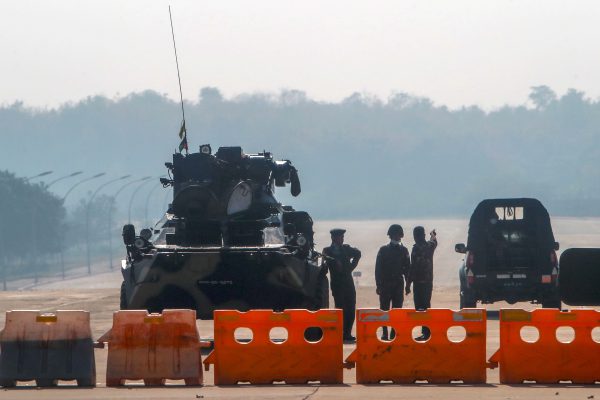SINGAPORE, 18 February 2021: Singapore’s foreign minister described Myanmar’s military coup as “alarming developments”, Reuters reported on Tuesday, but said he did not support widespread sanctions as they could hurt ordinary citizens.
In an address to parliament, Foreign Minister Vivian Balakrishnan said he hoped detainees including ousted leader Aung San Suu Kyi and President Win Myint could be released so they can negotiate with the ruling military council, which seized power 1 February.

Balakrishnan said Singapore was concerned about violent clashes at protests, the arrests of civil servants, internet blackouts and troop deployments and armoured vehicles in city streets.
“We hope they will take urgent steps to de-escalate the situation. There should be no violence against unarmed civilians. And we hope that there will be a peaceful resolution.”
Imposing broad sanctions against Myanmar would hurt its population, where poverty was rife, Balakrishnan said, adding he had conveyed this point in discussions with Western counterparts, including Germany.
Balakrishnan noted that Suu Kyi’s party had achieved a landslide victory in the November 2020 election and the coup was “a major setback” for Myanmar’s economy, adding Singaporean businesses might reassess their risk profiles and exposure to the country, Reuters reported.
Singapore has been the largest source of foreign investment into Myanmar in recent years, according to reports by both governments. Some firms in the city-state have been targeted by activists for their links to military companies the Reuters report suggested without providing further details.
Enterprise Singapore, a government agency, posts a background story on its Media Centre headlined ” Singapore the largest investor in Myanmar” first published by The Edge in 2019.
The report quotes Enterprise SG saying Myanmar remains a viable investment location for Singapore companies in agriculture and aquaculture, infrastructure — especially in utilities, power and urban development — as well as the manufacturing and consumer sectors. The education sector, covering preschool to higher education, was also identified along with opportunities for Singapore’s energy companies to participate in Myanmar’s power projects.
Singapore was identified in 2019 as Myanmar’s largest investor, outstripping even China. Myanmar is part of the ambitious Belt and Road Initiative; there are some 40 projects under the China-Myanmar Economic Corridor initiative, including infrastructure, agriculture and technology.
Enterprise SG said it saw a keen interest in Myanmar from Singapore companies despite the “diverse ethnicities, religions and political parties”. But back in February 2019, it also warned companies to keep a close eye on the upcoming 2020 elections.
From October 2018 to February 2019, Singapore had the highest FDI into Myanmar at USD20.6 billion, accounting for 26% of the total foreign investment. In 2017, the bulk of Singapore’s investment in Myanmar was in the information and communications sector (73%), followed by manufacturing (14%) and real estate (4.6%). Notable investments include Sembcorp industries’ USD310 million power plant in Myingyan.
Earlier in the week, an AFP report identified tourism as one of the sectors that had links to Myanmar’s military leaders. Apart from real estate investment that may include hotel projects, tourism, and hospitality, it remains a secondary investment opportunity for foreign companies when compared to oil, mining and the gems trade.
A Justice for Myanmar investigation earlier this week identified around 113 companies directly linked to eight military leaders and their families, but only a handful of businesses fell into the tourism and hospitality categories. They included two golf courses, two categorised as hotels and a small travel agency Myawaddy Travel & Tours allegedly linked to the military’s MEHL group. But that list does not include a variety of companies with links to tourism and aviation that gave donations to the military’s commercial entities according to a UN Human Rights report published in 2019 with subsequent updates.
(Source: Reuters with additional reporting)







